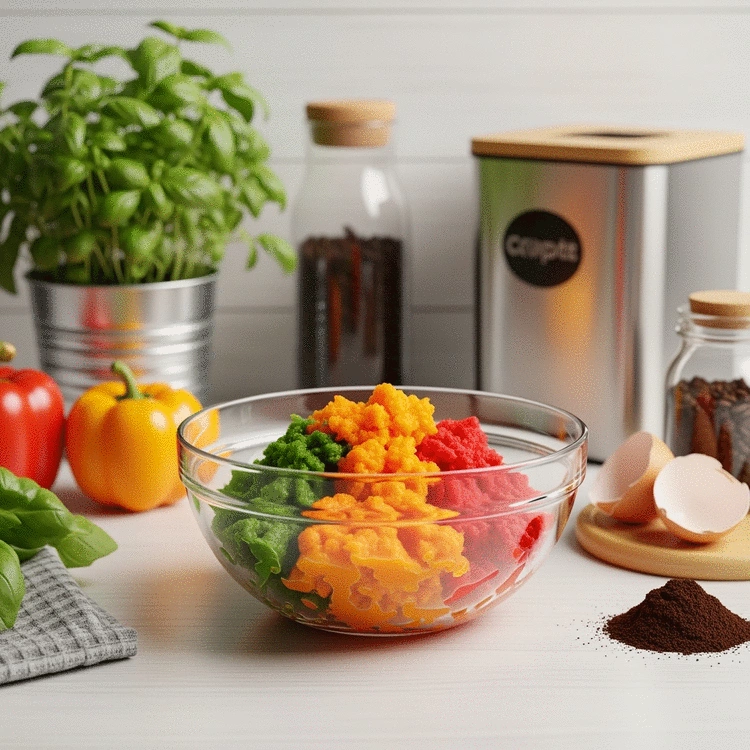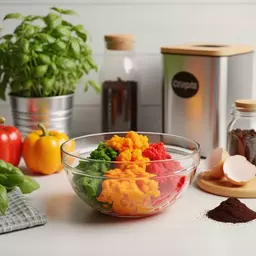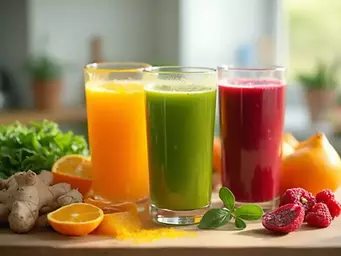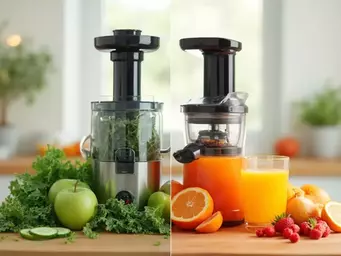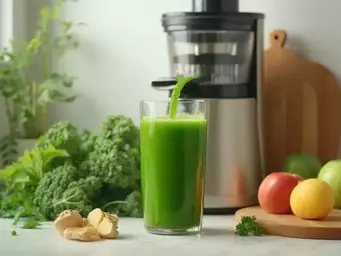What if the remnants of your fresh juice could nourish your garden instead of filling up landfills? Embracing juice pulp as a valuable resource not only enriches your soil but also contributes to a more sustainable kitchen. Let’s dive into the benefits of composting your juice pulp and how it can revolutionize your waste management!
What You Will Learn
- Juice pulp is nutrient-rich and can improve soil structure when composted.
- Composting juice pulp reduces landfill waste and contributes to eco-friendly practices.
- By composting, you can significantly lower methane emissions, aiding in the fight against climate change.
- Using compost from juice pulp enhances biodiversity in your garden, supporting beneficial organisms.
- You can inspire your community to adopt composting by sharing your journey and experiences.
- Incorporating juice pulp into recipes can minimize waste and promote a zero-waste lifestyle.
The Juicing Hub's Approach to Sustainable Juicing
Transforming kitchen waste into garden gold: Discover how juice pulp contributes to a healthier planet and a richer garden.
Why Compost Juice Pulp?
- ✓ Rich in Fiber: Improves soil structure.
- ✓ Nutrient-Rich: Essential vitamins & minerals.
- ✓ Eco-Friendly: Reduces landfill waste.
Transforming waste into a valuable resource.
Impact of Composting Kitchen Waste
- ✓ Reduces Methane: Curbs greenhouse gas emissions.
- ✓ Conserves Resources: Less need for chemical fertilizers.
- ✓ Supports Sustainability: Promotes a circular economy.
A step towards a more sustainable future.
Juice Extraction Process & Pulp Use
- 1. Preparation: Wash & cut produce.
- 2. Juicing: Extract liquid, leaving pulp.
- 3. Collection: Repurpose pulp for compost or other uses.
Utilizing every part of your juicing journey.
Benefits for Sustainable Gardening
- ✓ Improves Soil Structure: Better moisture retention.
- ✓ Boosts Nutrient Availability: Feeds plants naturally.
- ✓ Encourages Biodiversity: Supports beneficial microbes.
Nurturing your garden with juicing efforts.
Understanding Juice Pulp and Its Role in Kitchen Waste Reduction
Have you ever wondered what happens to the leftover fruits and vegetables after you make a delicious glass of juice? The juice pulp is often regarded as waste, but it can play a significant role in reducing kitchen waste and enriching your garden at the same time! At The Juicing Hub, we believe in maximizing every part of our ingredients, and that starts with understanding juice pulp.
Juice pulp is the fibrous byproduct left after extracting juice from fruits and vegetables. It's packed with wonderful nutrients and fiber, making it a fantastic addition to compost. By composting juice pulp, we can turn what many consider leftover waste into a valuable resource for nourishing our gardens. Want to know more? Let’s explore the benefits!
What Is Juice Pulp and Why Compost It?
Juice pulp contains a variety of nutrients that can benefit your garden. Here’s why composting it is a smart choice:
- Rich in Fiber: Juice pulp retains much of the fiber from fruits and vegetables, which aids in improving soil structure.
- Nutrient-Rich: It often contains vitamins and minerals, depending on the fruits and veggies used.
- Eco-Friendly: Composting reduces landfill waste and helps contribute to a more sustainable kitchen. For more information on the benefits of composting, you can refer to the EPA's guide to composting at home.
By composting juice pulp, we not only contribute to a healthier environment but also benefit our gardens with nutrient-dense soil. It’s a win-win!
The Importance of Reducing Kitchen Waste Through Composting
Kitchen waste is a major contributor to landfill overflow. By composting, we can significantly cut down on this waste. Here are some compelling reasons to consider:
- Reduces Methane Emissions: Composting organic materials like juice pulp helps reduce the release of methane, a potent greenhouse gas.
- Conserves Resources: Recycling kitchen scraps into compost lowers the need for chemical fertilizers. For detailed guidelines on home composting, the Texas A&M AgriLife Extension provides comprehensive information.
- Supports Sustainable Practices: Composting encourages a circular economy, where waste becomes a resource.
By embracing composting, we not only clear out our kitchens but also take a step towards a more sustainable future. Are you ready to join the movement?
Juice Extraction: The Process and Its Byproducts
Juice extraction is a simple yet fascinating process that yields flavorful juice while leaving us with pulp. Here’s a quick breakdown of how it works:
- Preparation: Wash and cut your fruits or vegetables.
- Juicing: Use a juicer to extract the liquid. The remaining pulp is often what gets discarded.
- Collection: Gather your juice pulp, and consider how you can repurpose it—either in compost or other creative uses!
Understanding this process can help you appreciate the value of every part of your juicing journey. At The Juicing Hub, we encourage you to look beyond the juice and consider the benefits of utilizing juice pulp in your kitchen practices!
Pro Tip
Did you know? Incorporating juice pulp into your daily meals can elevate both flavor and nutrition! Consider adding pulp to smoothies for added fiber or using it in baked goods like muffins or crackers. This not only minimizes waste but also enhances the nutritional value of your meals! The concept of transforming waste into valuable products, such as turning apple waste into profit and protein, highlights the broader potential of repurposing food byproducts as discussed in research from Cornell University.
Frequently Asked Questions About Composting Juice Pulp
- Q: What is juice pulp?
- A: Juice pulp is the fibrous residue left over after extracting juice from fruits and vegetables. It's rich in fiber and nutrients.
- Q: Why should I compost juice pulp?
- A: Composting juice pulp helps reduce kitchen waste, enriches your garden soil with nutrients, improves soil structure, and reduces methane emissions from landfills.
- Q: What are the environmental benefits of composting juice pulp?
- A: Composting reduces landfill waste, curbs greenhouse gas emissions (like methane), conserves natural resources by reducing the need for chemical fertilizers, and supports a circular economy.
- Q: Can juice pulp be used for anything else besides composting?
- A: Yes, juice pulp can be incorporated into various recipes, such as smoothies, baked goods like muffins or crackers, and even savory dishes to add fiber and nutrients.
- Q: How can I encourage my community to compost?
- A: You can inspire others by sharing your composting journey, hosting workshops, documenting your garden's progress, and exchanging tips with local gardening groups.
Encouraging Sustainable Practices: The Bigger Picture of Composting
When we talk about juicing, it’s not just about crafting the perfect beverage; it’s also about embracing a lifestyle that looks at sustainability holistically. Composting juice pulp plays a significant role in sustainable gardening practices, transforming what could be waste into a nutrient-rich resource for your garden. This circular approach not only benefits your plants but also contributes to a healthier planet!
By composting juice pulp, you’re reducing your carbon footprint and promoting a more sustainable way of living. Here’s how composting juice pulp contributes to sustainable gardening:
- Improves soil structure: Juice pulp enriches the soil, enhancing its texture and ability to retain moisture.
- Boosts nutrient availability: The organic matter in juice pulp provides essential nutrients that plants thrive on.
- Encourages biodiversity: A rich compost supports a variety of beneficial microbes and earthworms in your garden.
Imagine the satisfaction of tending to a garden nourished by your own juicing efforts! This practice not only gives back to your plants but also creates a sustainable loop that benefits the environment.
Inspiring Your Community: Sharing Your Composting Journey
At The Juicing Hub, we believe that sharing experiences can ignite change! When you start composting your juice pulp, don’t keep it to yourself. Encourage friends and family to join you by sharing your journey and the benefits you’ve witnessed. Whether it’s through social media or local gardening groups, your story can inspire others to take action.
Here are a few ways to inspire your community:
- Host a composting workshop: Share your knowledge and tips with others who are interested in sustainability.
- Share your garden’s progress: Document how composting juice pulp has improved your garden through before-and-after photos.
- Exchange ideas: Engage with local gardening clubs to swap tips and tricks for composting and juicing!
Inspiring others not only helps the community but also strengthens your commitment to sustainable practices. Who knows, you might just spark a juicing and composting revolution in your neighborhood!
Promoting a Zero-Waste Lifestyle Through Effective Waste Reduction
Embracing a zero-waste lifestyle means being mindful of every action we take, especially when it comes to food waste. Composting juice pulp is a powerful step toward reducing waste in our kitchens. It aligns perfectly with our mission at The Juicing Hub to inspire healthy living and sustainability.
Here are some effective strategies to promote a zero-waste lifestyle:
- Plan your meals: Reducing food waste starts with careful planning of what you buy and consume.
- Get creative with leftovers: Use juice pulp in various recipes, like muffins or smoothies, to minimize waste.
- Educate others: Share resources and information about composting and sustainable practices with your circle.
By actively participating in waste reduction, you not only transform your kitchen habits but also set an example for others to follow. Together, we can make a significant impact on our environment!
Recap of Key Points
Here is a quick recap of the important points discussed in the article:
- Juice Pulp Benefits: Juice pulp is rich in fiber and nutrients, making it a valuable addition to compost.
- Composting Importance: Composting reduces kitchen waste, lowers methane emissions, and supports sustainable practices.
- Zero-Waste Lifestyle: Planning meals and creatively using leftovers, like juice pulp, contribute to a zero-waste lifestyle.
- Community Engagement: Sharing your composting journey can inspire others to adopt sustainable practices.
- Sustainable Gardening: Composting juice pulp improves soil structure, boosts nutrient availability, and encourages biodiversity.
